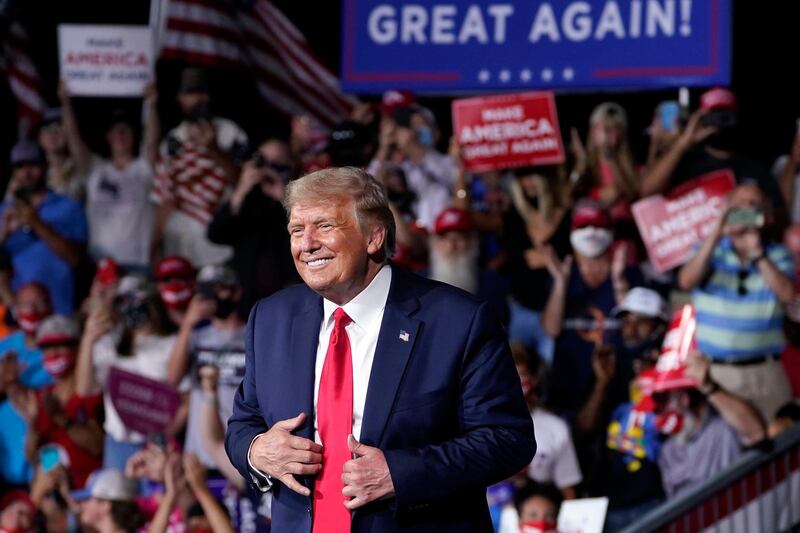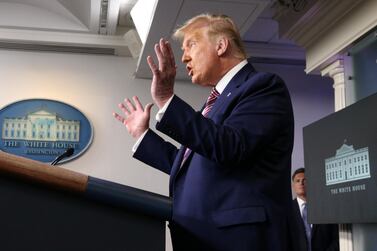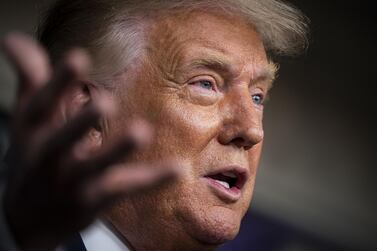US President Donald Trump’s low income tax payments are perfectly legitimate, say analysts, as like many of the world’s wealthy he has employed advisers to structure his affairs in a more efficient way.
Mr Trump used a number of financial manoeuvres to avoid paying federal income tax, an investigation by the New York Times found, despite earning hundreds of millions of dollars from his businesses and TV work such as The Apprentice.
"Those with higher wealth or cash are able to pay for advice to structure their tax affairs in a more efficient way," said Carl Reader, chairman of UK chartered accountancy business d&t.
“While some people or organisations might do this to ensure they are handling their tax affairs properly, others may look to avoid or evade tax."
Mr Reader referred to the Panama papers, a 2016 leak of more than 11.5 million financial and legal records that exposed the rogue offshore industry, where multinational clients allocated profits to different regions to reduce their tax burdens.
“This can also be done by individuals who might keep certain elements of their wealth and in turn, their tax liabilities, overseas,” said Mr Reader.
Mr Trump paid just $750 in federal income taxes in 2016, the year he became president, and in 2017, after reporting he had lost millions of dollars from his golf courses and had debts of $421 million. The investigation also found that he earned $73m abroad in his first two years in the White House, from countries such as the Philippines and Turkey.
In addition, Mr Trump paid no income tax at all in 10 of the last 15 years because he generated large losses that offset any money he had made. His predecessors Barack Obama and George W. Bush, each regularly paid about $100,000 a year in federal taxes.
Mr Trump said the report was a “total fake” at a press conference on Sunday. “I’ve paid a lot and I’ve paid a lot of state income taxes too”, he said, without going into specifics.
"As I understand it, he has been able to set business tax losses against most of his income. The details reported are quite complex, and are disputed by representatives of the Trump Organisation as being incorrect," Ian Roxan, director of the tax programme at London School of Economics and Political Science, told The National.
The analysis of more than two decades worth of Mr Trump’s personal and business returns, found that many of his businesses are struggling and that he relied on heavy losses across his business empire to help erase his federal income tax bill.
“You pay tax on what you make at the end of the day, rather than on what you take,” said Mr Reader, citing big companies such as Amazon that are often criticised for paying very little tax.
"Amazon will have very high revenue figures but they have a lot of costs underneath the line, so the profit that they make is actually relatively low," said Mr Reader, the author of Boss It. "If Trump has had losses, that implies that whilst he might have a lot of income coming in, he spent a lot more."
Steve Cronin, the UK founder of DeadSimpleSaving.com, said companies only pay taxes on business profits or capital gains on investments.
"Your losses can then be offset against business profits or capital gains in future years, so what Trump has done is not necessarily illegal, unless he has overstated his losses to avoid tax," said Mr Cronin.
"It shatters the myth that he is a successful businessman and thus well placed to manage the US economy and negotiate with other world leaders. The many years of losses are only being sustained by large loans guaranteed by his name, so he is going to have a difficult few years unless he can pay them off with some fresh sources of income."
Where tax affairs can "become tricky", Mr Reader said, is when companies place income overseas and then charge the resident business management fees with the intention of bringing down the profit figure. "So sometimes losses can be engineered," he said.
In the run-up to the election in 2016, Mr Trump refused to release his personal tax records – a move considered standard among candidates for the US presidency over the past few decades.
In the past, he said his tax returns are “very beautiful” and couldn't be released because they are under audit at the Internal Revenue Service.
"Due to his indebtedness, his reliance on income from overseas and his refusal to authentically distance himself from his hodgepodge of business, Trump represents a profound national security threat – a threat that will only escalate if he's re-elected," Timothy O'Brien, the author of TrumpNation told Bloomberg. "The tax returns also show the extent to which Trump has repeatedly betrayed the interests of many of the average Americans who elected him and remain his most loyal supporters."
Mr O’Brien was sued for libel by Mr Trump in 2006, who claimed the book misrepresented “his track record as a businessman and lowballed the size of his fortune”.
While Mr Trump lost the lawsuit in 2011, he avoided releasing his tax returns and other financial records during the litigation.
“My lawyers got the returns and while I can’t disclose specifics of what I saw, I imagine that Trump has always refused to release them because they would reveal how robust his businesses and finances actually are and shine a light on some of his foreign sources of income,” Mr O'Brien said.
The New York Times exposé found that Mr Trump wrote off a long list of what he classified as business expenses, including $70,000 to his hair stylist during his appearances on reality TV show The Apprentice, and more than $95,000 for hair and make-up services for his daughter, Ivanka Trump.
Mr Trump also treated a New York estate as an investment property for tax purposes despite listing it as a family retreat, and he used consulting fees as a way to pay his children, the newspaper claimed.
“It appears the president has gamed the tax code to his advantage and used legal fights to delay or avoid paying what he owes,” Ways and Means chairman Richard Neal said in a statement. Mr Neal’s tax-writing committee in the House of Representatives is engaged in ongoing litigation to obtain Mr Trump’s tax returns.

Mr Reader said using business costs to reduce your tax burden is standard practice, however, different tax jurisdictions around the world have laws around what you can and cannot include.
“Sometimes there are opportunities to utilise the grey area of some of that legislation, so there are areas where a business cost might be considered more of a personal benefit rather than a business benefit,” he said.
He points to the example of Lewis Hamilton, who avoided paying European taxes on his £16.5m private jet in 2017, by using a legal Isle of Man scheme to rent his own jet.
“Without investigation, the onus is on the business owner to decide whether it's a business cost or a personal cost," said Mr Reader. "For [Mr Trump], the question would naturally be about the legitimacy of the expenses. Can they all be considered tax deductible?”









